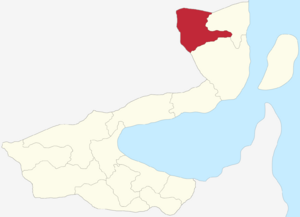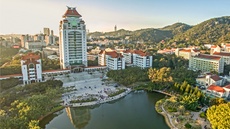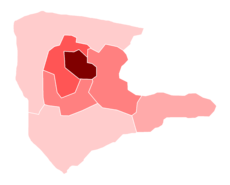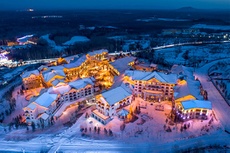Leibo
Leibo 莱波州 Láibō zhōu | |
|---|---|
 Map of Monsilva with Leibo highlighted | |
| Country | |
| State status | 1 July 1984 |
| Capital | Haimao (海茂) |
| Government | |
| • Body | Leibo State Government |
| • Premier | Tang Xiang (RNP) |
| • Deputy Premier | Wong Tai (PNP) |
| Population (July 2022) | |
| • Total | 1,353,539 |
| Time zone | TMB+11:00 (Monsilvan Eastern Time, MET) |
| ISO 3166 code | MS-LEI |
| GRP (¥) | ¥248 billion |
| Major airports | Haimao Damien International Airport (LBD) |
| Transit System(s) | MRA |
| Police[1] | Leibo State Police |
| Ambulance[2] | Leibo State Ambulance |
| Fire[3] | Leibo Fire Service |
Leibo (Monsilvan: 莱波州; Pinyin: Láibō zhōu), is a state of the Monsilvan Republic. The state has around 1.3 million people, with 54% of them living in the state's capital, Haimao. It is located in northern Monsilva, sitting north of Meixian and west of Luhai. Leibo is very mountainous, and is the coldest state in the entire country and holds Monsilva's only ski-resort. The state of Leibo is governed by the Leibo State Government, with Tang Xiang of the Reformed National Party being the current premier. The state is divided into 7 counties, 15 legislative constituencies and 29 municipalities and is represented by 2 Senators in the Senate and 15 members in the Legislative Assembly. The Leibo State Parliament consists of 29 seats, and is currently lead by the Reformed National Party, with the Liberal Party leading the opposition.
Leibo is Monsilva's second least populated state, and has the 3rd lowest urbanization of all the states, with 54% of the population living in urban areas. Leibo's industry is predominantly agricultural, with poppies being the state's largest export. In urban Leibo, the capital Haimao is the state's only city and has a large winter-tourism industry, with millions of people visiting the city in the winter months in order to take part in winter sports on the nearby mountain ranges. The city also has a large medical industry with lots of biomedical factories being built in the industrial sector of Haimao. Leibo has the lowest nominal GRP in Monsilva with around ₵41 billion, giving it a GRP per capita of ₵30,396.
Leibo is connected by the Monsilvan Railways Administration, which provide services throughout the state. Huachang has one major airport: Haimao Damien International Airport. Leibo is also well known for its often winding mountain roads and frequent road closures due to weather.
Contents
Toponymy
The name, Leibo derives from the HY Pinyin of the Monsilvan "萊波" (Láibō). The name has an archaic origin that has not been exactly determined. Etymologists debate the meaning of the state's name, however '波' is unanimously agreed to refer to 'waves', but since Leibo is landlocked, it is likely the waves refer to the meaning of the first character '萊', which is Monsilvan for the white goosefoot plant. The most agreed upon meaning for Leibo is 'waves of goosefoot'. The reason this is still commonly debated is because white goosefoot doesn't grow in significant quantities in Leibo.
History
Prehistory and early dynasties
Leibo has been inhabited for around 3000 years, which is much less than most of Monsilva, but this is likely due to Leibo's harsh conditions. During the early dynasties of Monsilva, Leibo was controlled by the Qin dynasty in all of its many forms until it united with other dynasties to form the Zhou dynasty. Leibo was not inhabited by very many people, so it is likely these people were rather cut off from the rest of the dynasty.
Zhou dynasty and the Empire of Baltanla
When the Unification of the Monsilvan Kingdoms took place in 1201, not much changed to Leibo. However, as the years went on Leibo began growing in population and the earliest discovered evidence towns originate from the late 13th century. This is also likely when the first settlement of Haimao was built. During the dynasty Leibo began to become a more agricultural state, growing fields of poppies which were used for traditional medicine. This made the region more important to the dynasty which lead to more towns being built.
However, as Leibo was integrated into the troublesome Beining Heavenly Kingdom, Leibo was also suffering from lots of freak weather events which were seriously damaging agricultural land and towns. This lead to famine and poverty for most of the small Leibo population.
When the Zhou dynasty voluntarily ceded itself to the Empire of Baltanla in 1568, the country was hopeful that the empire would bring it prosperity. Fortunately, after a few years under the Empire, Leibo, along with the rest of the country began a slow but steady recovery. Leibo began being more prepared for weather events and its agricultural industry started recovering.
Kingdom of Great Shan and the Civil War
When Monsilva left the empire in 1730, Leibo was in much better shape than how it had entered. It retained its position in the country's economy throughout the Kingdom of Great Shan, with little happening in the state.
The Monsilvan Civil War arrived in 1824, but fortunately Leibo saw little conflict, as the state was miles away from all conflict as the Liberate Monsilva Movement had already occupied most of northern Monsilva when the war started. Leibo was pressured a lot during the war however, as lack of medical products was becoming a major issue for the rebellion. This lead to a human rights crisis, where many Leibo women and children above the age of 10 were placed in mandatory 14 hour work cycles in factories to produce medical kits and other medical products for the war effort.
Kingdom of Monsilva and the Republic
After the war, Haimao had become a large industrial city. However, the dissatisfaction of the Leibo citizen's treatment, as well as the prejudice against Leibo's large foreign population lead to many of the city's factories being burnt down. The Haimao Revolt was troubling for the government which was already suffering economically after just winning a civil war. This lead to a formal apology and distribution of compensation for affected families in 1833, three years after the civil war ended. Fortunately, this ended the Haimao Revolt, as well as closed down most of the city's factories.
Since then, Leibo returned to its focus to medicinal agriculture. However, during the 1950s and 60s, biomedical companies began building factories in Haimao again which lead to a lot of protests which were quickly supressed by the government which was under martial law after 1963.
When the Monsilvan Republic was established in 1978, Leibo was still a region, but now under the state of Beining which also included a portion of what is now northern Meixian as well as all of the current state of Luhai. Then, in 1984, Leibo was established as a state in the new federal system, which created the Leibo State Government and dissolved the Beining State Government. The Leibo State Government has been lead by the RNP since its establishment. However, since the 2023 Leibo state election, the RNP leadership has been threatened by the Liberal Party which lead to the RNP forming its coalition with the PNP just before the election so that it could keep control of the Leibo parliament.
Administration
Local government
The state of Leibo is governed by the Leibo State Government, based in the Leibo State Office in Haimao. The state parliament is a unicameral legislature consisting of a 29-seat State Parliament. Each municipality in Leibo is represented by one State Parliament Member. Members are elected for four-year terms. The Parliament meets every week, with the day depending on the first weekday after the state election which takes place in different states at different times. The leading party in the State Parliament determines who will be the Premier. Tang Xiang of the RNP has been the Premier of Leibo since 2011.
National government
Leibo is represented in the Parliament of Monsilva by 2 Senators in the Senate of Monsilva and 15 Members of the Legislative Assembly.
Geography
Leibo is a very mountainous state, with mountians all across most of the state. However, down in the south east and in the very centre, valleys and plains can be found where most of Leibo towns are and where you can find Haimao. Leibo is home to Monsilva's only ski resort and has many fields of poppies and other medicinal flora which are exported from the state to the rest of the country as well as across the continent. Leibo's many mountains have created an incredible landscape which is home to many national parks which are often visited by tourists.
Climate
Leibo is Monsilva's coldest state due to its high elevation. This leads to frequent snow and ice, as well as snowstorms and avalanches. Temperatures in Haimao usually sit around -5 degrees celcius during the late autumn to early spring, whilst temperatures can reach as high as 26 degrees celcius in the summer.
Demography
| Country of Birth | Population | Percent | |
|---|---|---|---|
| 1,344,470 | 99.3 | ||
| Non-Monsilvan | 9,069 | 0.7 | |
| 4,061 | 0.3 | ||
| 2,707 | 0.2 | ||
| Others | 2,301 | 0.17 | |
| Total | 1,353,539 | 100.0 | |
The 2022 census recorded that 9,069 people or 0.7% of Leibo's population were of non-Monsilvan descent. The table to the right shows the most common countries of origin of Leibo residents. Leibo has the lowest non-Monsilvan population of any state.
Religion
Leibo is one of Monsilva's most secular states, with 49.4% of the population putting 'Unaffiliated' for religion on the 2022 census.
Following the 'Unaffiliated' category in the census was Monsilvan folk religion at 39.8%; then it was Buddhism at 6.1%; and finally 'Other' (which includes Christianity and Islam) took up the last 4.7%.
Transport
Leibo's transport is administered by the state's Department for Transport, which is a sub-department of the federal Department of Transport. Leibo is served extensively by the MRA. In terms of public road transport, bus and coach services run across the state, and connect to other locations around the country.
Haimao, the state's capital, is served by an extensive bus network. As well as this, there are several cable cars which transport people over the mountains and up to the Daxueshan Ski Resort.
Education

Education is mandatory until the age of 16 for children living in Leibo, which is also the minimum age at the federal level. Leibo's towns and cities feature many schools, from elementary to high school. As well as this, Leibo is home to many small colleges and the state's one university: the Haimao International University
Haimao International University is Monsilva's only mega-multilingual university, proving courses in 9 languages (Monsilvan, Jackian, Creeperian, Baltanese, Cantuath, Gandorian, Kivuian and Quebecshirite). The university specialises in teaching Monsilvan studies along with many different history subjects. The university is partnered with the Academia Silvitica which educates people across Terraconserva about Monsilvan culture as well as being a general education institute within Monsilva, teaching subjects such as natural sciences and geography.
Culture
Tourism
Leibo is popular amongst tourists for being home to Monsilva's only ski resort, as well as having unique snowy mountain temples and national parks. Most tourists stay in Haimao, while the most visited places are outside of Haimao and are mostly national parks and Daxueshan Ski Resort.
Around 5 million people visit Leibo every year, with the majority being in the winter months, while the summer months have the lowest amount of tourists.
Sport
Association football is the most popular sport in Leibo, followed by skiing and yuchio. Leibo is the only state in Monsilva with a winter sport as one of its most popular sports, likely due to the difficulty of hosting winter sports in most of the country. However, the most popular sport in Leibo is football which is also the nation's most popular sport.
Football is a big deal in Leibo. When matches are being played by Leibo's biggest team, Haimao City F.C., in the Monsilvan Super League a large projection of the match is played in the Haimao City Square, where thousands of people watch the match in the square or in nearby businesses.
In 1996, after a match between Haimao F.C. and its biggest rival, Tsingyi City F.C., a massive riot broke out over the result which was a draw. The riot caused the Emergency Response Police (colloquially known as the Chinching or 紧警) to be called. The riot resulted in the death of one person as well as serious injury to around 37 people. It was the first time in Monsilva that a sports match had resulted in the death of a person.



